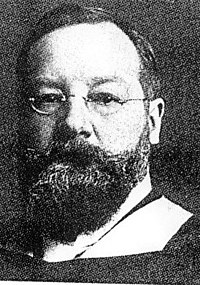Edward B. Titchener
| Edward B. Titchener | |
|---|---|
 |
|
| Born | Edward Bradford Titchener 11 January 1867 Chichester, England |
| Died | 3 August 1927 (aged 60) Ithaca, New York |
| Citizenship | English |
| Nationality | British |
| Fields | Psychology |
| Institutions | Cornell University |
| Alma mater | Clark University |
| Doctoral advisor | Wilhelm Wundt |
| Doctoral students | Edwin Garrigues Boring, Margaret Floy Washburn |
| Known for | structuralism, empathy, introspection |
| Spouse | Sophie Bedloe Kellogg |
Edward Bradford Titchener (/ˈtiːtʃənər/; 11 January 1867 – 3 August 1927) was a British psychologist who studied under Wilhelm Wundt for several years. Titchener is best known for creating his version of psychology that described the structure of the mind: structuralism. He created the largest doctoral program in the United States (at the time) after becoming a professor at Cornell University, and his first graduate student, Margaret Floy Washburn, became the first woman to be granted a PhD in psychology (1894).
Titchener's parents, Alice Field Habin and John Titchener, eloped to marry in 1866 and his mother was disowned by her prominent Sussex family. His father held a series of posts as a clerk or in accountancy before dying of tuberculosis in 1879. The family, of five surviving children (4 girls, 1 boy), moved at least 10 times during this time. When he was 9, Titchener was sent to live with his paternal grandparents and two aunts. His namesake grandfather was a successful solicitor and investor and also an ex-mayor of Chichester. He ensured that Titchener was first privately tutored and then given a grammar school education. However, his investments collapsed in 1881 and he died a few months later. In the reduced financial circumstances, Titchener's subsequent education was funded by scholarships, paid employment and entrepreneurial activities.
Titchener attended The Prebendal School and Malvern College and then went on to Oxford (Brasenose College) from 1885 to 1890. He graduated with a rare 'double first' BA degree in classics in 1889. His interests began to change to biology. At Oxford, Titchener first began to read the works of Wilhelm Wundt. During his time at Oxford, Titchener translated the first volume of the third edition of Wundt's book Principles of Physiological Psychology from German into English. He spent an extra year at Oxford in 1890, working with John Scott Burdon-Sanderson, a physiologist to learn scientific methodology. Titchener went on to Leipzig in Germany to study with Wundt in autumn 1890. He completed his doctoral program in 1892 with a dissertation on binocular vision. In summer 1892 he returned to Oxford and Burdon-Sanderson where taught in the Oxford Summer School.
...
Wikipedia
